Filmography
- Katia (1938)
- The Innocent (1938)
- The Rebel (1938)
- The World Will Tremble (1939)
- As Long as I Live (1946)
- Destiny Has Fun (1947)
- After the Storm (1948)
- Guilty? (1951)
Voldemar Rosenberg, better known by his stage name Wal-Berg (born October 13, 1910, Istanbul - July 12, 1994, Suresnes) was a French composer and conductor.
Rosenberg studied piano at the Berlin Conservatory and then attended the Paris Conservatory, where he studied harmony, composition, and conducting under Samuel Rousseau, Noel Gallon, Henri Rabaud, Philippe Gaubert, and Pierre Monteux.
From 1932 to 1936, he orchestrated for Polydor Records recordings, and composed songs performed by Marlene Dietrich (Moi je m'ennuie, Assez, Embrasse-moi ). In the 1930s he was involved with the recordings of stars of the era such as Jean Sablon, Josephine Baker, Charles Trenet, Leo Marjane, and Damia. He also wrote film music, e.g. for the film Katia (with Danielle Darrieux).
During World War II, he was in Monte Carlo, where he conducted symphonic jazz concerts, whose programs included George Gershwin and Cole Porter alongside Maurice Ravel and Claude Debussy. He also worked with ORTF on a series of radio broadcasts, in which he conducted orchestras backing soloists such as Yehudi Menuhin and Andres Segovia.
In the 1950s, he toured widely in Europe as a conductor with Victoria de Los Angeles and Segovia, and worked in France with Janine Micheau, Mathé Altéry, Roger Bourdin, Stéphane Grappelli, and at the Opéra de Lille with Mado Robin and Christian Ferras.
He composed more than 300 pieces for symphony orchestra and scored about forty films.

Karel Ančerl was a Czechoslovak conductor and composer, renowned especially for his performances of contemporary music and for his interpretations of music by Czech composers.
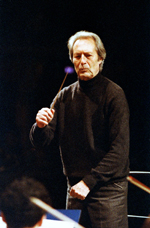
Carlo Maria Giulini was an Italian conductor. From the age of five, when he began to play the violin, Giulini's musical education was expanded when he began to study at Italy's foremost conservatory, the Conservatorio Santa Cecilia in Rome at the age of 16. Initially, he studied the viola and conducting; then, following an audition, he won a place in the Orchestra dell'Accademia Nazionale di Santa Cecilia.

Charles Munch was an Alsatian French symphonic conductor and violinist. Noted for his mastery of the French orchestral repertoire, he was best known as music director of the Boston Symphony Orchestra.
Walter Goehr was a German composer and conductor.
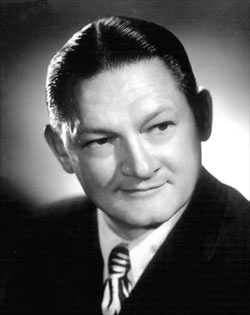
Albert Victor Young was an American composer, arranger, violinist and conductor.
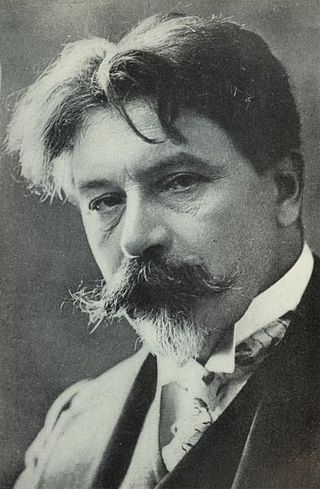
Arthur Nikisch was a Hungarian conductor who performed internationally, holding posts in Boston, London, Leipzig and—most importantly—Berlin. He was considered an outstanding interpreter of the music of Bruckner, Tchaikovsky, Beethoven and Liszt. Johannes Brahms praised Nikisch's performance of his Fourth Symphony as "quite exemplary, it's impossible to hear it any better."
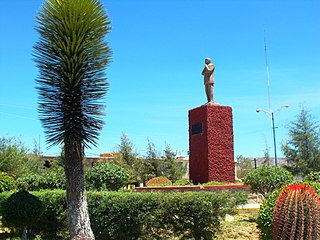
Julián Carrillo Trujillo was a Mexican composer, conductor, violinist and music theorist, famous for developing a theory of microtonal music which he dubbed "The Thirteenth Sound".
Lucien Cailliet was a French-American composer, conductor, arranger and clarinetist.
Balys Dvarionas, was a Soviet and Lithuanian composer, pianist, conductor and educator. Dvarionas first became known as a composer after World War II. His works are in a romantic vein, with roots in folk song.
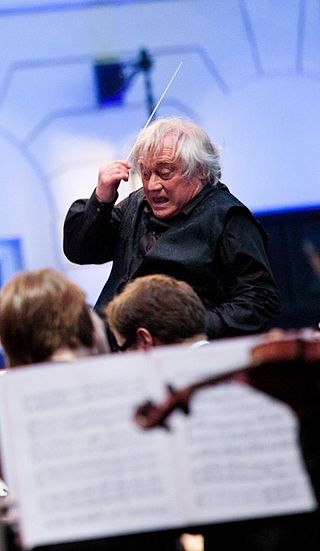
Jerzy Jan Maksymiuk is a Polish composer, pianist and orchestra conductor.

Werner Janssen was an American composer and conductor of classical music and film scores. He was the first New York-born conductor to lead the New York Philharmonic. For his film work he was nominated for six Academy Awards.
Piero Coppola was an Italian conductor, pianist and composer.
Hans Haug was a Swiss composer and conductor, mainly of operas and theatrical music. He also became known as a composer for the classical guitar.
Joel Spiegelman is an American composer, conductor, concert pianist, harpsichordist, recording artist, arranger, author and teacher.
Neil Chotem was a Canadian composer, arranger, conductor, pianist, and music educator.

Derek Gleeson is an Irish/American musician. Born in Dublin, Ireland. He is currently the music director and conductor of the Dublin Philharmonic Orchestra and has been the conductor at the Anna Livia Dublin International Opera Festival. Since 2012 Gleeson is also music director & conductor of the Rachmaninov Festival Orchestra. Since January 2016 Gleeson is Principal Guest Conductor or The Harbin Symphony Orchestra, Harbin, China. He also composes musical scores for film and television and of symphonic music for the concert hall.
Arie van Beek is a Dutch music teacher and conductor.
James Dixon was an orchestra conductor and music educator in the United States. During his career he was principally associated with the University of Iowa and the Quad City Symphony Orchestra.
Vakhtang (Vato) Kakhidze is a Georgian composer and conductor. He is the son of conductor Jansug Kakhidze. He graduated and postgraduated from the Moscow State Conservatory. He studied composition with Nikolai Sidelnikov and orchestration with Edison Denisov. Kakhidze is the conductor of Tbilisi Symphony Orchestra since 1993.

Black conductors are musicians of African, Caribbean, African-American ancestry and other members of the African diaspora who are musical ensemble leaders who direct classical music performances, such as an orchestral or choral concerts, or jazz ensemble big band concerts by way of visible gestures with the hands, arms, face and head. Conductors of African descent are rare, as the vast majority are male and Caucasian.